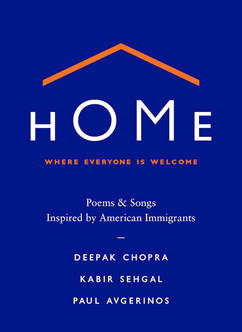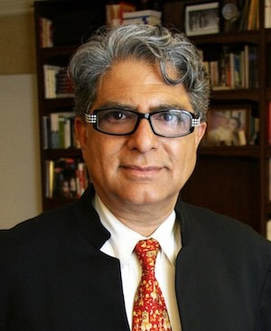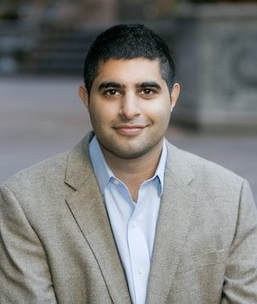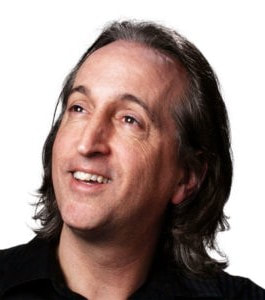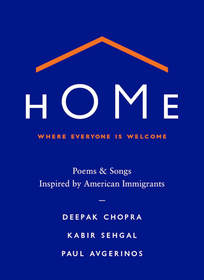June 2018 Featured Interview |
|
Interview with
Deepak Chopra,
Kabir Sehgal & Paul Avgerinos
|
Click Book Cover to Purchase
|
About HOME:
HOME is a collection of thirty-four original poems and twelve songs inspired by a diverse group of immigrants. From Yo-Yo Ma to Audrey Hepburn, Albert Einstein to Celia Cruz, these poems and songs symbolize the many roads that lead to America, and which we expect will continue to converge to build the highways to our future. This unique collaboration is a keepsake hardcover book with a CD of original new age music tucked inside. Additionally, there is a digital-only spoken word audio book edition in which Deepak Chopra reads the poems. |
Deepak Chopra
|
About Deepak:
Deepak Chopra, M.D., FACP, is an immigrant who was born in New Delhi, India, moved to the United States in 1970, and became a citizen in 1984. He is an American author, lecturer and music composer who has contributed to seven albums and written over eighty-five books translated into over 43 languages, including numerous New York Times best sellers. One of his songs Do You Love Me, featuring Demi Moore, hit #10 on Billboard and remained on the chart for thirteen weeks. He recited Nehru’s “Spoken at Midnight” speech on Ted Nash’s Presidential Suite, which won the Grammy Award for Best Large Jazz Ensemble Album in 2017. TIME magazine has described Dr. Chopra as “one of the top 100 heroes and icons of the century.” As the founder of The Chopra Foundation and co-founder of Jiyo and the Chopra Center for Wellbeing, he is a world-renowned pioneer in integrative medicine and personal transformation. |
|
Kabir Sehgal
|
About Kabir:
Kabir Sehgal is a first generation American whose parents are from India. He is a New York Times and Wall Street Journal bestselling author of eight books, including Coined: The Rich Life of Money and How Its History Has Shaped Us and Jazzocracy: Jazz, Democracy, and The Creation of a New American Mythology. Among his works are children’s books that he has written with his mother (The Wheels on the Tuk Tuk and A Bucket of Blessings). He is also a contributor to Fortune and Harvard Business Review. A multi-Grammy and Latin Grammy Award-winning producer, he has collaborated with jazz artists such as Chucho Valdés, Arturo O’Farrill, and Ted Nash. Kabir is also a composer and musician. A U.S. Navy veteran, he works and lives in New York City. |
Paul Avgerinos
|
About Paul:
Paul Avgerinos is a first generation American, whose father, Costas, emigrated from Greece to the U.S. in 1938. Paul is a Grammy-winning artist, composer, producer, and engineer with 23 critically acclaimed New Age albums to his credit. He is active in creating scores for a variety of television shows and has also collaborated with Jewel, Run DMC, and Willie Nelson. Paul’s multi-step, intuitive creative process includes archetype and style guide development, meditation, mantra and prayer. He is a graduate of the Peabody Conservatory of Johns Hopkins University. He runs Studio Unicorn and lives with his family in Redding, CT. |
Nancy Burger, senior editor, sat down with Paul to discuss the genesis of Home and working with Deepak and Kabir, who responded to questions via email.
What kind of feedback are you getting on the project? How is it hitting people?
There was a lot of emotional response in the way people identified with it. It made them want to share their own family stories and, in some cases, to dig into their own stories more - which was really beautiful. A lot of people are saying how it's such a common thread in America and a fundamental aspect of who we are as a nation, both culturally and as a society. We thought it was really important to stand up and reaffirm that in a time when it's being questioned.
I'm curious about how the project started.
Kabir and I were talking about doing something focused on oneness and togetherness. I was thinking more about a tour through the great religions and showing how they are all based on love and acceptance and compassion. But Kabir thought that could be divisive, and I saw the pitfalls there - that it might fall short of the intended goal. Meanwhile, Kabir was talking with Deepak about doing something on the current political climate. So, I'd say Kabir was the mastermind. He knows everyone - he's one of those guys.
How did you meet Kabir?
We both won Grammy awards in the same year (2016), so we met through that process. I liked him immediately and knew there was no way I wouldn't learn a lot by working with him. And that's what happened. He would challenge me and call me on stuff. He's really a cool guy. We started talking about a project at the end of 2016, and by the beginning of 2017, we had Deepak on board and started planning.
Did you all work collectively on the list of immigrants to celebrate?
We would each do research on our own and then pow-wow together to share our lists. There are so many cool immigrant stories. The poems were more Deepak and Kabir, and the music was more me - but there was a lot of overlap.
So, you all had a hand in everything?
Yes, and each of us had veto power. If there was something someone really didn't like or really wanted to include, the rest of us considered that very respectfully. And the amazing thing is how quickly we put it together - it was done in about four months. A normal book with a publisher the size of Hachette is typically a two-year process. So, that tells me it was meant to be because it was so timely.
The poem inspired by your dad ("Odyssey") was very provocative.
Yes, Deepak and Kabir wrote that poem with a little input from me. I think they really summed up my father's story. He wasn't limited by his origins or what he was taught to think.
I loved the line in "Odyssey", "Where you're from matters less than what you believe."
When you say you believe in the American dream, that's really what you're saying - that you believe in unfulfilled potential, that anything is possible, that you're not defined by your past, your origin story, what your parents believed or the color of your skin. That, to me, is the heart of what's wonderful about this country, and that acceptance is a huge part of it because, of course, you're going to have vastly different beliefs among people. Sometimes it's challenging to accept those different beliefs, but we must abide with it. It's a two-way street.
Your father spent several decades working in the U.S. defense industry and William Jimeno, the inspiration behind the poem "Survivor," helped in the rescue efforts during the 9-11 attacks. Could you tell me more?
Yes, and that's why the poem about the first responder ("Survivor") really sums up the project. It's the essence of the American immigrant story. He was born in Colombia, moved to the U.S. as a child and rushed in to help during the attacks on September 11th. Kabir made a similar point that, when he was serving in active duty, there were many young men and women on the front line that weren't even citizens. They were out there risking their lives for this American ideal. Those two stories speak volumes, I think. There's a lot of noise around, but you learn a lot more about who's who and what's what by watching what people do.
What kind of feedback are you getting on the project? How is it hitting people?
There was a lot of emotional response in the way people identified with it. It made them want to share their own family stories and, in some cases, to dig into their own stories more - which was really beautiful. A lot of people are saying how it's such a common thread in America and a fundamental aspect of who we are as a nation, both culturally and as a society. We thought it was really important to stand up and reaffirm that in a time when it's being questioned.
I'm curious about how the project started.
Kabir and I were talking about doing something focused on oneness and togetherness. I was thinking more about a tour through the great religions and showing how they are all based on love and acceptance and compassion. But Kabir thought that could be divisive, and I saw the pitfalls there - that it might fall short of the intended goal. Meanwhile, Kabir was talking with Deepak about doing something on the current political climate. So, I'd say Kabir was the mastermind. He knows everyone - he's one of those guys.
How did you meet Kabir?
We both won Grammy awards in the same year (2016), so we met through that process. I liked him immediately and knew there was no way I wouldn't learn a lot by working with him. And that's what happened. He would challenge me and call me on stuff. He's really a cool guy. We started talking about a project at the end of 2016, and by the beginning of 2017, we had Deepak on board and started planning.
Did you all work collectively on the list of immigrants to celebrate?
We would each do research on our own and then pow-wow together to share our lists. There are so many cool immigrant stories. The poems were more Deepak and Kabir, and the music was more me - but there was a lot of overlap.
So, you all had a hand in everything?
Yes, and each of us had veto power. If there was something someone really didn't like or really wanted to include, the rest of us considered that very respectfully. And the amazing thing is how quickly we put it together - it was done in about four months. A normal book with a publisher the size of Hachette is typically a two-year process. So, that tells me it was meant to be because it was so timely.
The poem inspired by your dad ("Odyssey") was very provocative.
Yes, Deepak and Kabir wrote that poem with a little input from me. I think they really summed up my father's story. He wasn't limited by his origins or what he was taught to think.
I loved the line in "Odyssey", "Where you're from matters less than what you believe."
When you say you believe in the American dream, that's really what you're saying - that you believe in unfulfilled potential, that anything is possible, that you're not defined by your past, your origin story, what your parents believed or the color of your skin. That, to me, is the heart of what's wonderful about this country, and that acceptance is a huge part of it because, of course, you're going to have vastly different beliefs among people. Sometimes it's challenging to accept those different beliefs, but we must abide with it. It's a two-way street.
Your father spent several decades working in the U.S. defense industry and William Jimeno, the inspiration behind the poem "Survivor," helped in the rescue efforts during the 9-11 attacks. Could you tell me more?
Yes, and that's why the poem about the first responder ("Survivor") really sums up the project. It's the essence of the American immigrant story. He was born in Colombia, moved to the U.S. as a child and rushed in to help during the attacks on September 11th. Kabir made a similar point that, when he was serving in active duty, there were many young men and women on the front line that weren't even citizens. They were out there risking their lives for this American ideal. Those two stories speak volumes, I think. There's a lot of noise around, but you learn a lot more about who's who and what's what by watching what people do.
Deepak Chopra Interview:
Home attempts to shine a light on how central immigrants are to the history and vibrancy of America. You have referred to the project as an effort to engage in "sacred activism." Could you explain this to our readers?
Sacred activism means increasing your awareness about the world around you. It’s looking at injustices or problems in the world, and then asking yourself and others “What can I do about this?” When we all try to think about how to improve the world, we collectively create a soul-force to actually change the world.
Do you think the message of Home is resonating with its audience? What message do you hope it will send?
Yes, it is resonating. We traveled all over America and many people showed up wanting to share their family immigration stories. I hope that we send a feeling of welcome to everyone - that America is a hospitable and genial place.
In a recent interview you said, "Even moral outrage is rage," and that it only adds to turbulence around difficult issues. How do you advise people to handle rage?
To observe your anger. Simply notice yourself getting angry, and you will then become aware of your emotions and feelings. This observation will create the space for you to ask yourself “Why am I angry?” By asking the question you will inevitably detach and create distance from your emotions. I also encourage you to take deep breathes to calm yourself in these situations.
You have described poets and musicians as society's conscience, as its rebels and trouble-makers. Is that why you thought it was important to weave poetry and music together for this project?
Yes, the artists are the trouble-makers and changemakers. The resistance starts in the creative community because artists are uninhibited and can’t be controlled. The government may be able to influence and control scientists and business people. But never artists.
As an immigrant yourself, can you share a story from your early days in America that illustrates how you were made to feel (or not to feel) at home?
I was born in India and came to America as a physician. That America needed and wanted immigrant physicians was indeed a sign. America valued people from other countries who could improve the lives and health of its citizens. I’ve experienced my share of discrimination but, on the whole, I’ve been fortunate and have lived the American dream.
What is one of your happiest recollections about completing this project with Paul and Kabir?
This was the first time I have sung on an album. It was fun to work with Paul and Kabir in the studio - they helped me on the vocals.
Home attempts to shine a light on how central immigrants are to the history and vibrancy of America. You have referred to the project as an effort to engage in "sacred activism." Could you explain this to our readers?
Sacred activism means increasing your awareness about the world around you. It’s looking at injustices or problems in the world, and then asking yourself and others “What can I do about this?” When we all try to think about how to improve the world, we collectively create a soul-force to actually change the world.
Do you think the message of Home is resonating with its audience? What message do you hope it will send?
Yes, it is resonating. We traveled all over America and many people showed up wanting to share their family immigration stories. I hope that we send a feeling of welcome to everyone - that America is a hospitable and genial place.
In a recent interview you said, "Even moral outrage is rage," and that it only adds to turbulence around difficult issues. How do you advise people to handle rage?
To observe your anger. Simply notice yourself getting angry, and you will then become aware of your emotions and feelings. This observation will create the space for you to ask yourself “Why am I angry?” By asking the question you will inevitably detach and create distance from your emotions. I also encourage you to take deep breathes to calm yourself in these situations.
You have described poets and musicians as society's conscience, as its rebels and trouble-makers. Is that why you thought it was important to weave poetry and music together for this project?
Yes, the artists are the trouble-makers and changemakers. The resistance starts in the creative community because artists are uninhibited and can’t be controlled. The government may be able to influence and control scientists and business people. But never artists.
As an immigrant yourself, can you share a story from your early days in America that illustrates how you were made to feel (or not to feel) at home?
I was born in India and came to America as a physician. That America needed and wanted immigrant physicians was indeed a sign. America valued people from other countries who could improve the lives and health of its citizens. I’ve experienced my share of discrimination but, on the whole, I’ve been fortunate and have lived the American dream.
What is one of your happiest recollections about completing this project with Paul and Kabir?
This was the first time I have sung on an album. It was fun to work with Paul and Kabir in the studio - they helped me on the vocals.
Kabir Sehgal Interview:
You brought a lot of different expertise to this project - that of a musician, author, businessman, Grammy-winning producer, composer, and U.S. Navy veteran. What do you feel you tapped into most heavily while working on Home?
I suppose I tapped into my curiosity. I’ve tried to follow my curiosities into different areas, from music to writing, to finance and military. When you investigate the things in which you are most interested, you will add passion to your path of self-discovery. But “follow your curiosity” isn’t just my mantra. It’s that of many immigrants from all cultures who have attained success in America.
Do you think Home is resonating with its audience? What message do you hope it will send?
Yes, because the poetry and music on Home is incredibly diverse. We wanted to make sure that all Americans could find a “home” on this project. For example, we featured a cellist on this album who traces her roots back to the very beginning of our country. We also featured an oud player who is an immigrant from Turkey. The message that we hope to send is simply, ‘It doesn’t matter where you’re from. What matters is where we’re going together.’
What is one of your happiest recollections of completing this project with Deepak and Paul?
Paul and Deepak are intelligent and wise. And it was an honor to learn from them. But I have to tell you – they are both really funny. Paul and I had a great time during the release week when we launched the project at NASDAQ. He and I kept looking at each other and shaking our heads like ‘We can’t believe this is happening.’ Regarding Deepak, I had to pick him up at six in the morning to drive to the airport. And as soon as he got in the car, he started speaking eloquently about consciousness for the next hour. It was quite a way to wake up in the morning!
As part of every interview, we ask our guests where they find their sanctuary. Where do you find yours?
D: I find my sanctuary in awareness of my thoughts, feelings, and emotions.
K: My sanctuary is music - playing it, performing it, meditating on it.
P: That's a real premise of the project. Home is where the heart is and where the spirit is. It's about being at peace, aligned with your purpose and relaxing into that blessed state.
You brought a lot of different expertise to this project - that of a musician, author, businessman, Grammy-winning producer, composer, and U.S. Navy veteran. What do you feel you tapped into most heavily while working on Home?
I suppose I tapped into my curiosity. I’ve tried to follow my curiosities into different areas, from music to writing, to finance and military. When you investigate the things in which you are most interested, you will add passion to your path of self-discovery. But “follow your curiosity” isn’t just my mantra. It’s that of many immigrants from all cultures who have attained success in America.
Do you think Home is resonating with its audience? What message do you hope it will send?
Yes, because the poetry and music on Home is incredibly diverse. We wanted to make sure that all Americans could find a “home” on this project. For example, we featured a cellist on this album who traces her roots back to the very beginning of our country. We also featured an oud player who is an immigrant from Turkey. The message that we hope to send is simply, ‘It doesn’t matter where you’re from. What matters is where we’re going together.’
What is one of your happiest recollections of completing this project with Deepak and Paul?
Paul and Deepak are intelligent and wise. And it was an honor to learn from them. But I have to tell you – they are both really funny. Paul and I had a great time during the release week when we launched the project at NASDAQ. He and I kept looking at each other and shaking our heads like ‘We can’t believe this is happening.’ Regarding Deepak, I had to pick him up at six in the morning to drive to the airport. And as soon as he got in the car, he started speaking eloquently about consciousness for the next hour. It was quite a way to wake up in the morning!
As part of every interview, we ask our guests where they find their sanctuary. Where do you find yours?
D: I find my sanctuary in awareness of my thoughts, feelings, and emotions.
K: My sanctuary is music - playing it, performing it, meditating on it.
P: That's a real premise of the project. Home is where the heart is and where the spirit is. It's about being at peace, aligned with your purpose and relaxing into that blessed state.

